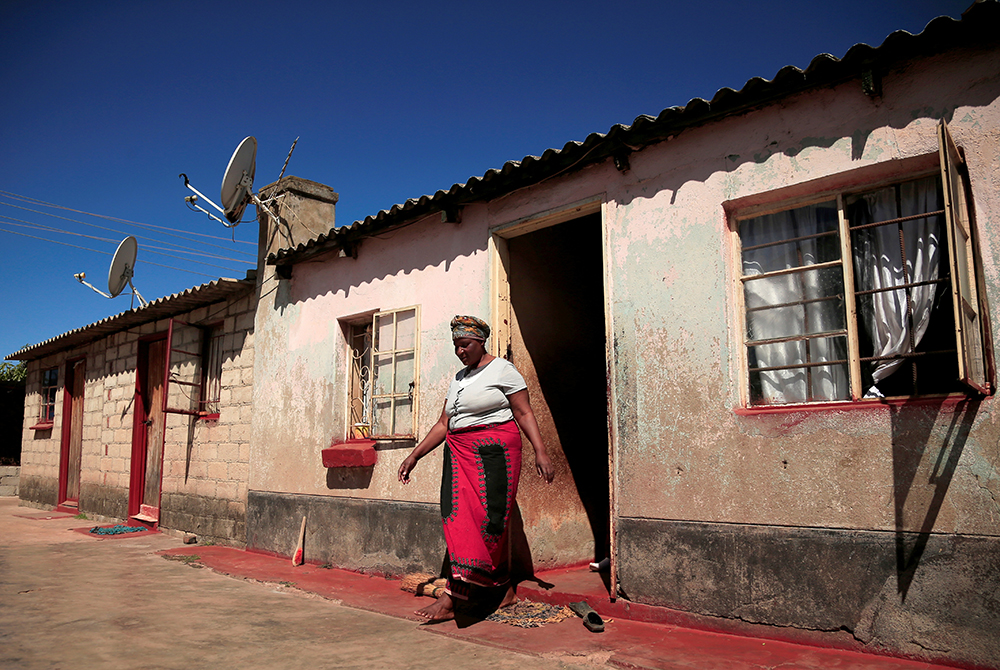
A woman walks out of her family home in Harare, Zimbabwe, May 9, during the COVID-19 pandemic. (CNS/Reuters/Philimon Bulawayo)
Coronavirus lockdown measures in Zimbabwe have come as both a disruption and an opportunity for the Catholic Church to rediscover itself, say bishops in the southern African country, with priests committing to continued ministry to the faithful as a way of providing hope and spiritual guidance.
Zimbabwe now has more than 2,800 infections and 41 deaths after a rapid increase in the spread of the pandemic in the past two weeks, with the government tightening movement and religious gathering restrictions across the country.
The Harare Cathedral has also reported a coronavirus-related death as the pandemic starts to hammer various communities, although the two big cities of Harare and Bulawayo are the most affected, according to data from the Health Ministry.
The lockdown measures, which have been tightened to restrict religious gatherings to less than 50 people, have disrupted activities of the Catholic Church, with some parishes suspending Masses and other gatherings.
The Zimbabwe bishops' conference has been supportive of these measures, viewing the disruptions occasioned by coronavirus as a novel way for the church in the country to rediscover itself.
The conference said in a July 16 pastoral letter that Catholic faithful in Zimbabwe have had to find ways "to sustain each other in faith through praying together as families, encouraging each other through social media and accompanying one another" in both sickness and death.
"The disruption, which we have struggled with, has become an opportunity for the church to rediscover herself," said the conference. The bishops also emphasized that activities such as "worship and prayer the way we were accustomed has been greatly disrupted."
Fr. Frederick Chiromba, the conference's secretary general, told NCR by phone that the Catholic Church now has to catch up to new norms of worship, prayer and communion. He said the coronavirus pandemic has forced Zimbabwean Catholics to "reflect on other possibilities than what we are used to" in terms of faith practices.
"The issue of coronavirus disruptions being an opportunity for the church to redefine itself is in reference to the new way of worshipping we are adopting as a domestic church," said Chiromba. "It is an encouragement for families to get together and to read Scriptures together and for the faithful to redefine other possibilities so that we manage to continue with worship and other practices."
Advertisement
Chiromba further said that adoption of new platforms to carry out faith practices for the Catholic Church helps in giving hope to the faithful who are having to bear the difficulties imposed by coronavirus in terms of limited movement and other general hardship. Digital platforms have been taken up with renewed vigor, and the church is now also using the internet to distribute teachings and other content, with WhatsApp groups helping priests to reach out to parishioners.
However, the redefinition and rediscovery of how the Catholic Church conducts its faith practices has not been any easier for priests on the ground, as they are faced with the reality of Zimbabwe's limited internet infrastructure and capacity.
Zimbabweans are battling economic hardships that have worsened under the coronavirus pandemic, and most of them cannot afford high-speed bundles that allow for easy live-streaming. Inflation has shot up to around 800 percent.
Fr. Martin Nyadewo emphasized this in an interview with NCR, saying his parish in Mbare, just outside the central business district in the capital Harare, "cannot use a lot of social media platforms" such as Facebook Live.
"The key one we use here is WhatsApp. This is how we are meeting the spiritual needs of people," he said.
And when there is a real need for physical visits, the priests have to risk and go visit the sick and minister at funerals. However, they have to adhere to stricter health safety measures such as social distancing, wearing of masks and sanitization.
"This is a difficult time to really minister to people of God because it is within our own training and formation that we are with the people, but with this pandemic we can't minister to the people as usual," said Nyadewo. "Our hope is that this is the best way to curb the spread of coronavirus."
The bishops are, however, aware of the challenges that priests are facing under the new disruptions. The conference emphasized that Catholic priests in Zimbabwe have had to make extra efforts "carrying on with pastoral activities amidst difficult" times.
They further highlighted that they are "inspired by your caring for the flock entrusted to us by the eternal shepherd" under challenging times. The Zimbabwean bishops also pleaded with priests to continue to be available for parishioners and to keep giving hope to the burdened in society.
"We thus make a special call for you [priests] to be available, to be compassionate, and to be of service to God's people," read the pastoral letter.
The bishops also highlighted what they called a "severe disruption" in Zimbabwe's education system, with the government banning in-person classes for colleges and universities and suspending the reopening of lower-level schools, originally planned for July 28.
Some Catholic-run educational institutions such as Bondolfi Teachers' College have already redefined the way learners will continue with studies under the current disruptions.
Kizito Chitsama, the principal at Bondolfi told Catholic Church News Zimbabwe that "students were divided into manageable WhatsApp groups of forty so that they continue to interact with their lecturers" and continue with studies.
"We carried out an induction workshop for utilizing online learning before students left so that no one will miss out on their studies," said Chitsama.
Like other religious and national leaders across the world, the heads of the Catholic Church in Zimbabwe were not ready for the pandemic nor were they ready for the new norms that are shaping up. However, church leaders say they are willing to learn.
"I don't think anybody is ready as such because nobody fully knows what the future holds," said Chiromba. "But to a certain extent we can say that we are all [bishops, priests and parishioners] ready to learn. It's a situation where we all need to learn together and growth together."
[Tawanda Karombo is a business and financial technology journalist based in Harare, Zimbabwe, with more than 10 years of experience covering sub-Saharan Africa.]






